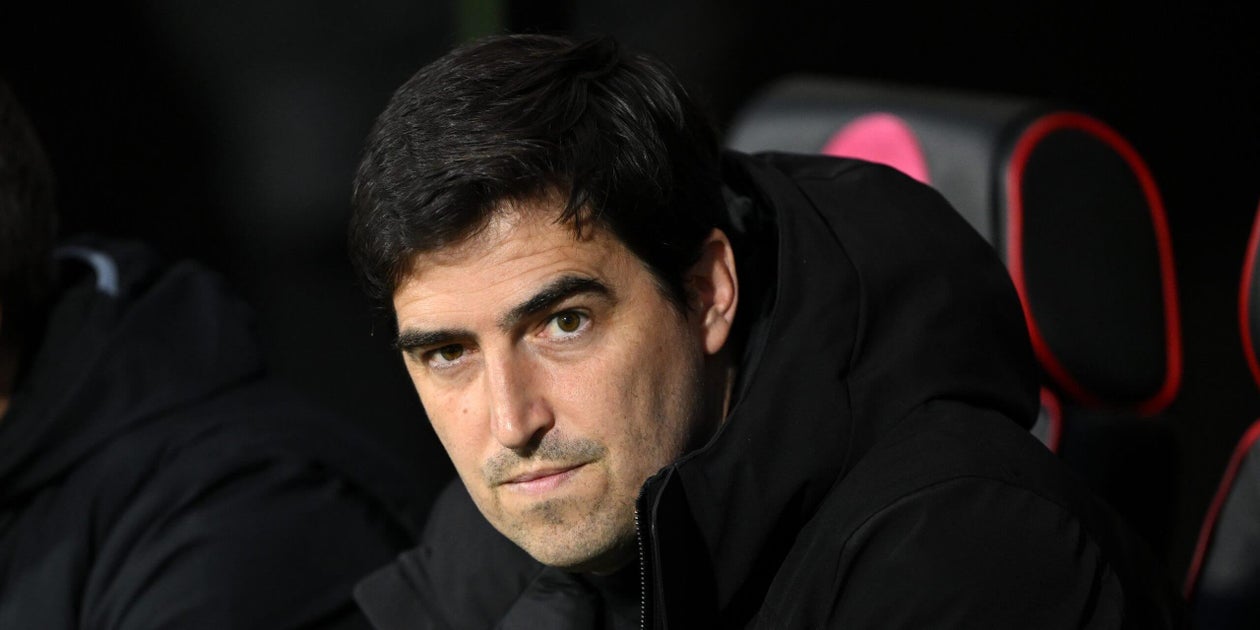“When we sign players, I’m an assistant to them,” says the Bournemouth head coach Andoni Iraola.
He is discussing the rebuild of his squad, which has been depleted after a ninth-placed finish, which also included the club’s highest-ever Premier League points haul last season.
Bournemouth have sold centre-back Dean Huijsen to Real Madrid, left-back Milos Kerkez to Liverpool and they have lost goalkeeper Kepa Arrizabalaga at the end of a loan spell from Chelsea. Further outgoings are expected, while centre-back Illia Zabarnyi has today joined Paris Saint-Germain for a deal that could reach €66million.
Iraola has lost the defensive core of the team that secured Premier League wins against Arsenal, Manchester City, Manchester United, Tottenham Hotspur and Newcastle United last season but, seated in a boardroom of a Chicago hotel, the Spanish coach is calmer than many of his peers might be in a similar situation.
At Bournemouth, the club’s structure works in a particular way, where Iraola sees his role as coaching the team and preparing the players, but recruitment is delegated to Tiago Pinto, the club’s president of football operations, and technical director Simon Francis. Hence his “assistant” role.
Already this summer, Bournemouth have secured replacements, signing goalkeeper Djordje Petrovic from Chelsea for £25million and left-back Adrien Truffert from Rennes for £14.4m. This weekend, they agreed a £30.3m deal to sign 24-year-old centre-back Bafode Diakite from Lille, whose defence was bettered only by PSG in terms of goals against last season in the French top flight.
Last summer, Iraola lost centre-forward Dominic Solanke to Tottenham in a £65m deal but his replacement Evanilson — signed for £40.2m from Porto — scored 10 goals in his first season in the Premier League. The coach trusted his club to deliver the goods.
“When we sign players, I try to help as much as I can,” Iraola says.”I give my opinion, especially the kind of player we need and the demands that will be needed for that position, but I don’t control the market as well as they do.
“Obviously, if they ask me about a player in the Premier League, I will give a very precise and a very good evaluation, but for us, it’s very difficult to sign players from the Premier League. I don’t think we have signed anyone from the Premier League while I have been here. Most of the players we sign are from other leagues and a lot of them, I don’t control.”
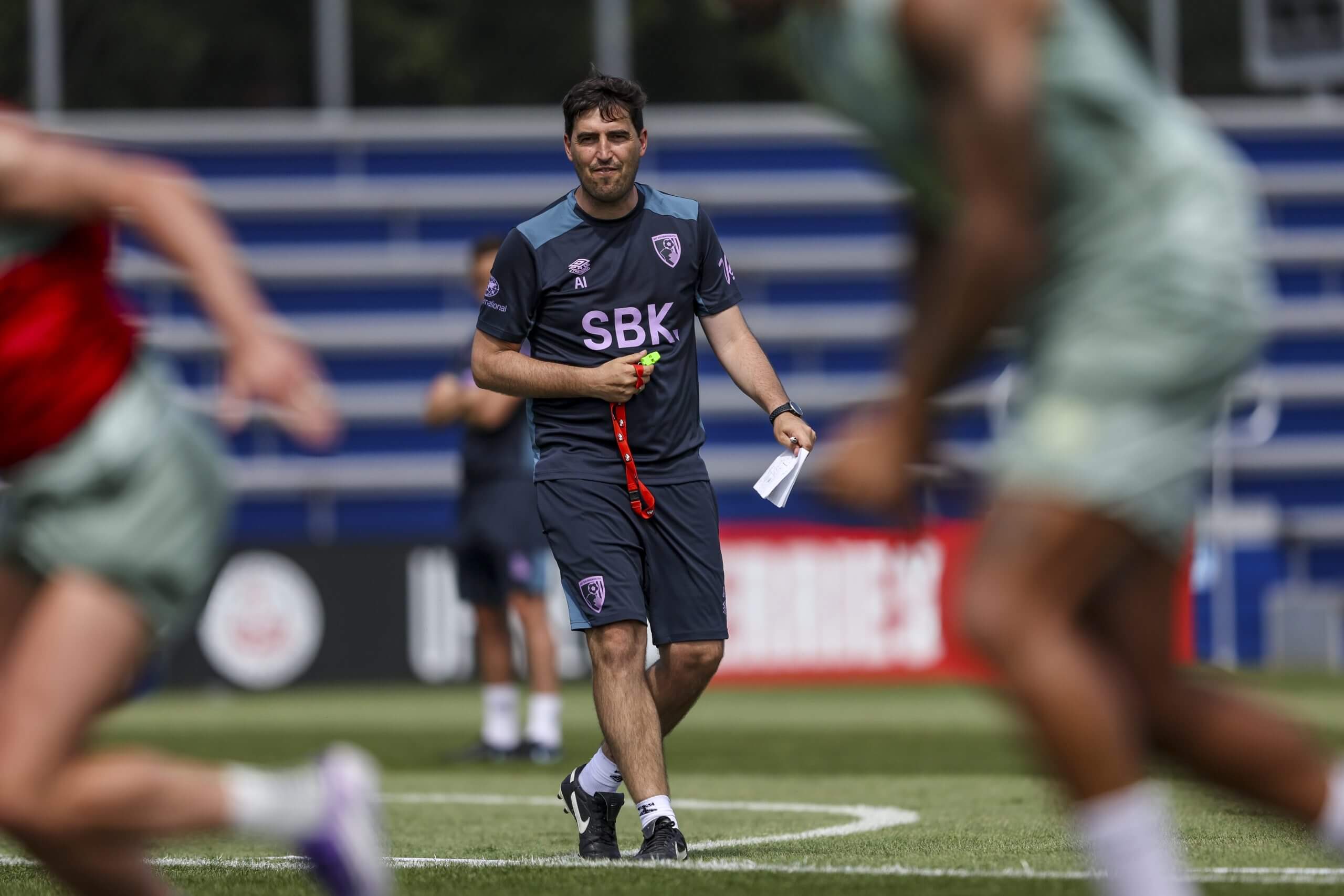
Iraola oversees a Bournemouth training session at Flames Field, University of Chicago, last month (Getty Images)
Iraola is speaking English and when he says he does not “control” the market in all leagues, he means it in the sense of not having full knowledge of every possible player in every league.
“You can watch a video and you will watch a game from a player, but probably this is not solid enough not to give a strong opinion,” the 43-year-old explains.
The Athletic points out that many coaches are not so humble as to actually admit they do not know everything about the transfer market. Others are not prepared to delegate responsibilities to recruitment experts.
“For me, it is the truth,” Iraola says. “Sometimes, I watch a player and I don’t like what I see from the beginning — it may be in the way he moves or his reactions. I watch not only how a player is technically and physically. For example, one thing I look at is their reactions when the team scores a goal. I like it when players celebrate and they are very happy, even if they haven’t been involved in anything for the goal and they haven’t touched the ball.
“I try to somehow get to people who know that player or know things about their character, or about their personal life. But I am not a specialist in signing players. Ninety-five per cent of the job is done by people who, in this case, know more than me.”
When it comes to coaching, however, Iraola leaves no stone unturned. Last summer, after a 12th-placed finish in his first season at Bournemouth, Iraola challenged his players to aspire. In his debut season, Bournemouth did not win any Premier League matches against teams who finished in the top six of the table. He sat his players down in pre-season and gave them a new goal, insisting they were capable of overcoming the best teams in the league on one-off occasions.
They did a double over second-placed Arsenal, took four points from fifth-placed Newcastle, beat Manchester City at home and demolished Nottingham Forest, who spent much of the campaign in the European places, by a 5-0 scoreline. They also beat Manchester United 3-0 at Old Trafford for the second season in a row.
“We had very good wins against the best teams, apart from Liverpool, who is still the only team we don’t find a way to get points against,” says Iraola.
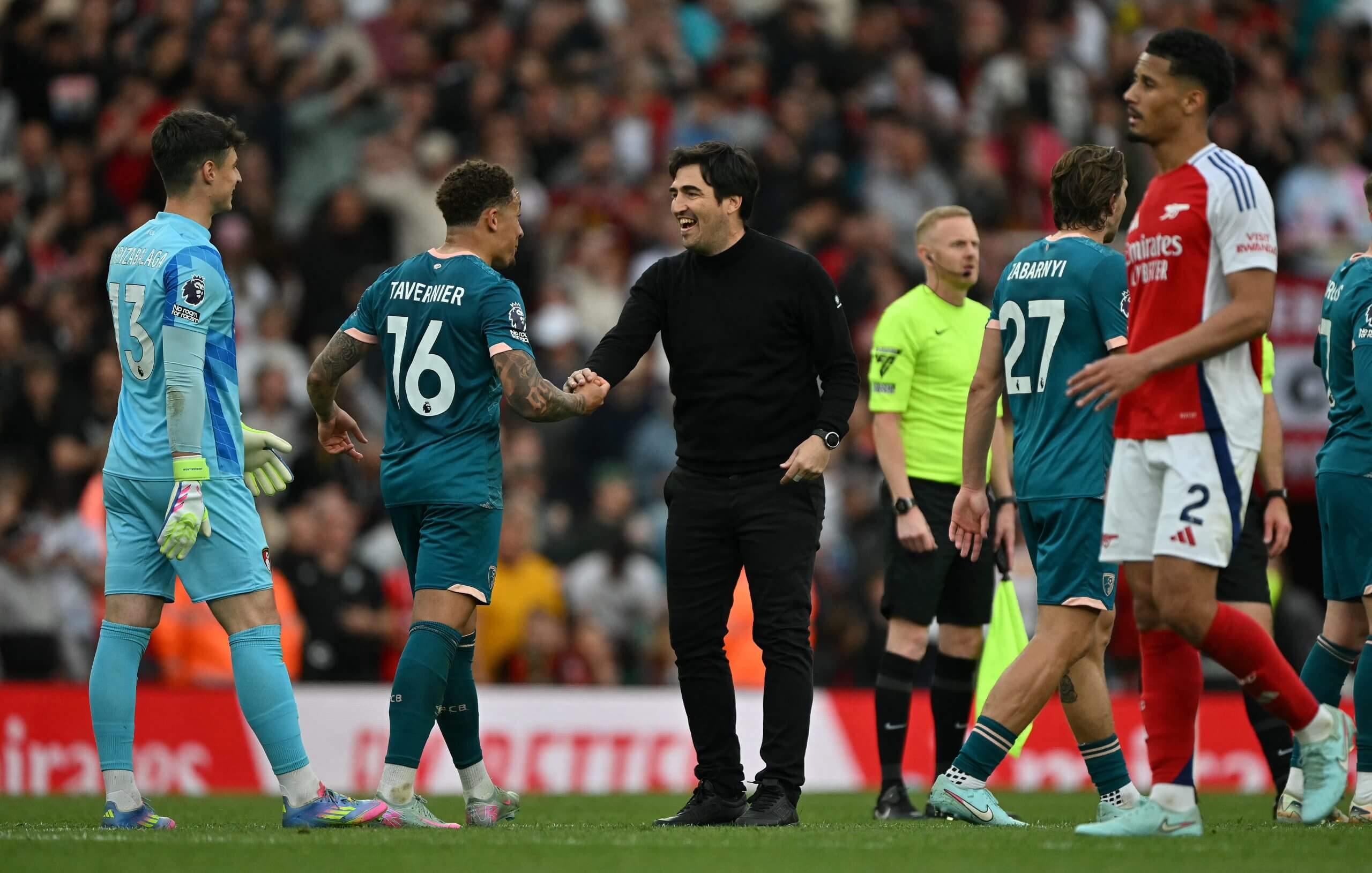
Iraola celebrates Bournemouth’s 2-1 win over Arsenal at the Emirates Stadium (Glyn Kirk/AFP via Getty Images)
While in the U.S. on pre-season, he spent time with staff at the NFL’s Chicago Bears but he has also taken inspiration from studying the NBA. He spent a season at the end of his playing career in the MLS at New York City FC, where he followed the New York Giants in the NFL, but became a Minnesota Timberwolves fan due to his admiration for power forward Kevin Garnett. It was a period where he explored the U.S. from East Coast to West Coast, also spending a summer in the Rockies and travelling to Vancouver in Canada.
“I took a cruise to Alaska. There is just one highway!” he laughs.
“With the NFL, we can learn from the methodology, particularly on set pieces.” Iraola smiles. “They have this playbook and they have 200 to 300 plays. They put everything together so that 50 players are on the same page. They find a way to adjust from week to week, and nobody forgets what they have to do.”
In soccer, Iraola says different players have different capacities for taking on instructions.
“There are players who know what they have to do at a set play and also know what the other 10 players have to do. Normally, the first two to three set plays are quite easy to remember, but when it gets a little bit messy and they start to get tired, they are not always able to do what they’ve been told.
“We have to keep it much more simple than (NFL). We don’t have the luxury of so many stops in play. If we were to have a timeout, football would lose a little bit of what it is. Football is different and unique because you cannot correct so much in real-time. It’s a dynamic sport.”
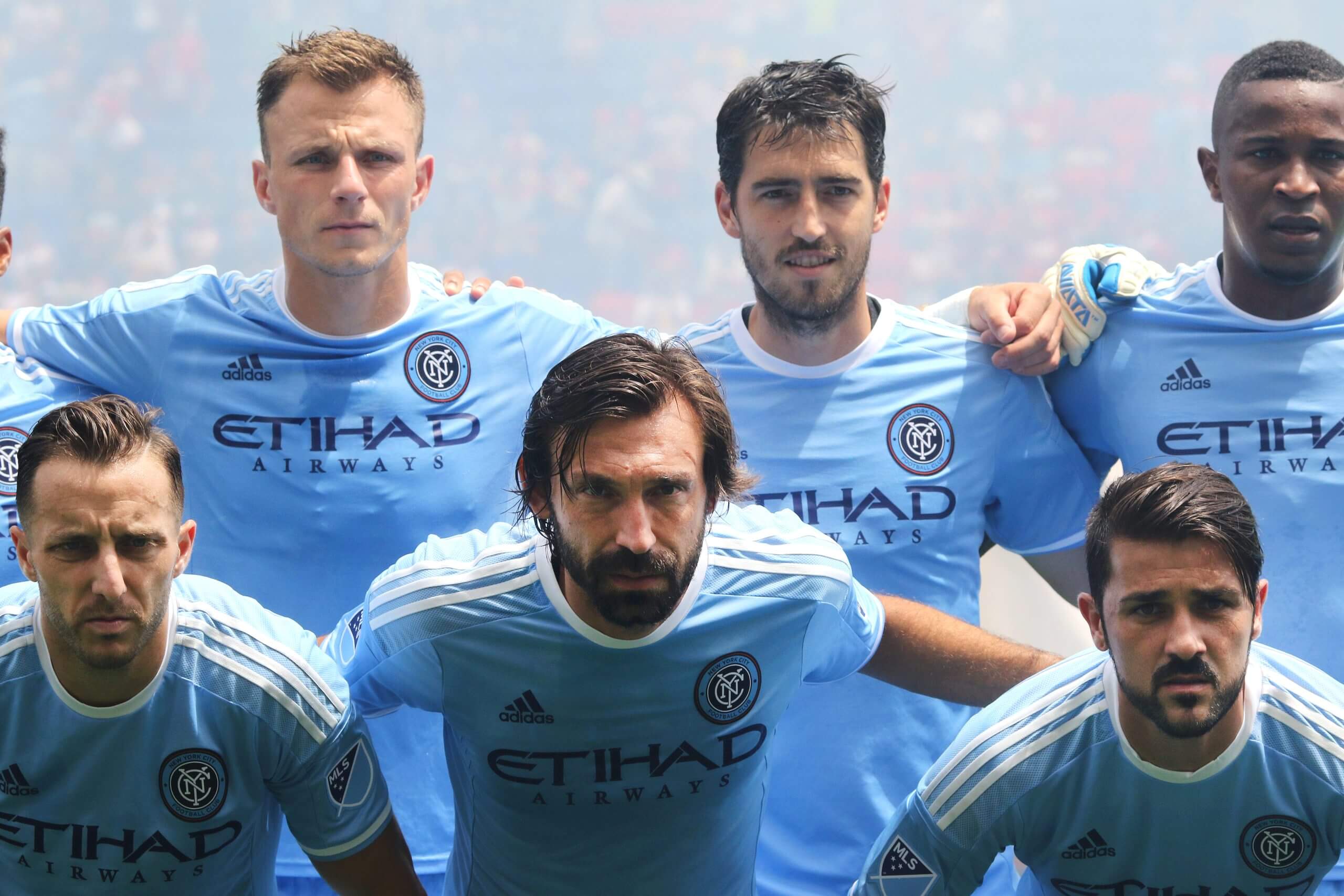
Iraola, above Andrea Pirlo and David Villa, at New York City FC in 2016 (Tim Clayton/Corbis via Getty Images)
Is it scary as a coach when you prepare so much but then cede so much control?
“You have to accept it and trust players,” Iraola answers. “There are players in your team who can correct the others in-game. Normally, these are midfielders or central defenders, who see more and correct how we are pressing or the spaces we are occupying. For us, it is guys like Ryan Christie, Lewis Cook, Tyler Adams and Marco Senesi; players who are in the middle, who have experience and understand the game globally.”
Iraola still watches the NBA, looking for tricks he can apply to his own team.
“In basketball, you can shoot, but what are the other players doing when a player shoots? How many do you send forward and leave behind so they are also ready for the defensive transitions?” he says.
“Then there are the lookouts; it is not just the one on the ball to think about, it’s the others too. What are they doing and why are they not going to the rebound? Why are they opening the court with two guys?
“Basketball is also about creating these mismatches. They are trying to force a match-up of our best player against their weakest player. If your strong player is the inside player in basketball, then you have to shoot threes, but then they may close everything on the inside and this will allow you go outside. You need to have different threats.”
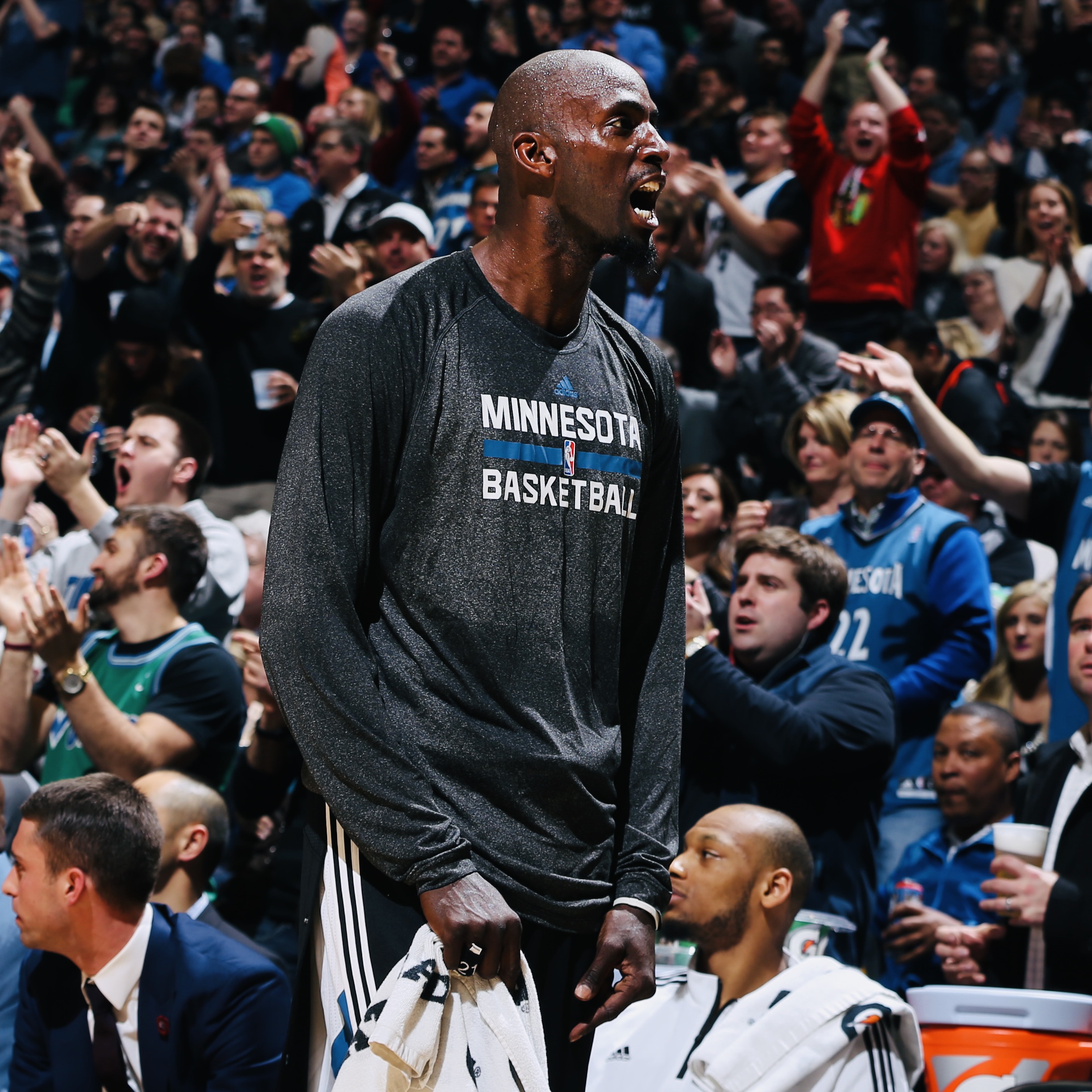
Kevin Garnett — an inspiration of Iraola’s — playing for the Minnesota Timberwolves in February 2015 (David Sherman/NBAE via Getty Images)
Iraola is used to thinking deeply about his own sport. During a 12-year spell at Athletic Club, where he made over 400 appearances, he played under Marcelo Bielsa. He recalls how the Argentine coach created training drills designed to produce outcomes that had been achieved during games by some of the world’s best teams and players.
“We named exercises after players who we were watching on the video,” Iraola explains. “One was Juan Roman Riquelme because it was something he had done at Boca Juniors. It makes it fun and relatable for players to use real examples, but you also need a mixture of everything. It cannot be only to try to copy what others are doing.”
Iraola is still in his first decade of coaching, having previously worked in more humble environments at AEK Larnaca in Cyprus and second-tier Mirandes in Spain before arriving in the Spanish top flight by achieving promotion with Rayo Vallecano. In his first jobs, where clubs were less handsomely staffed, he would be extremely hands-on: “It was me cutting the videos, editing everything with the assistant coach, basically working without an analyst and doing everything.”
Now he has five analysts at his disposal at Bournemouth.
“Even now, with all our facilities and staff, I want to be the first one setting up and I am the one putting the cones out,” says Iraola. “I’m measuring the distances. I feel more comfortable this way. I am learning how to use every person in the best way. At the beginning (at Bournemouth), I used to do post-match (analysis) and my own edit (of analysis videos).”
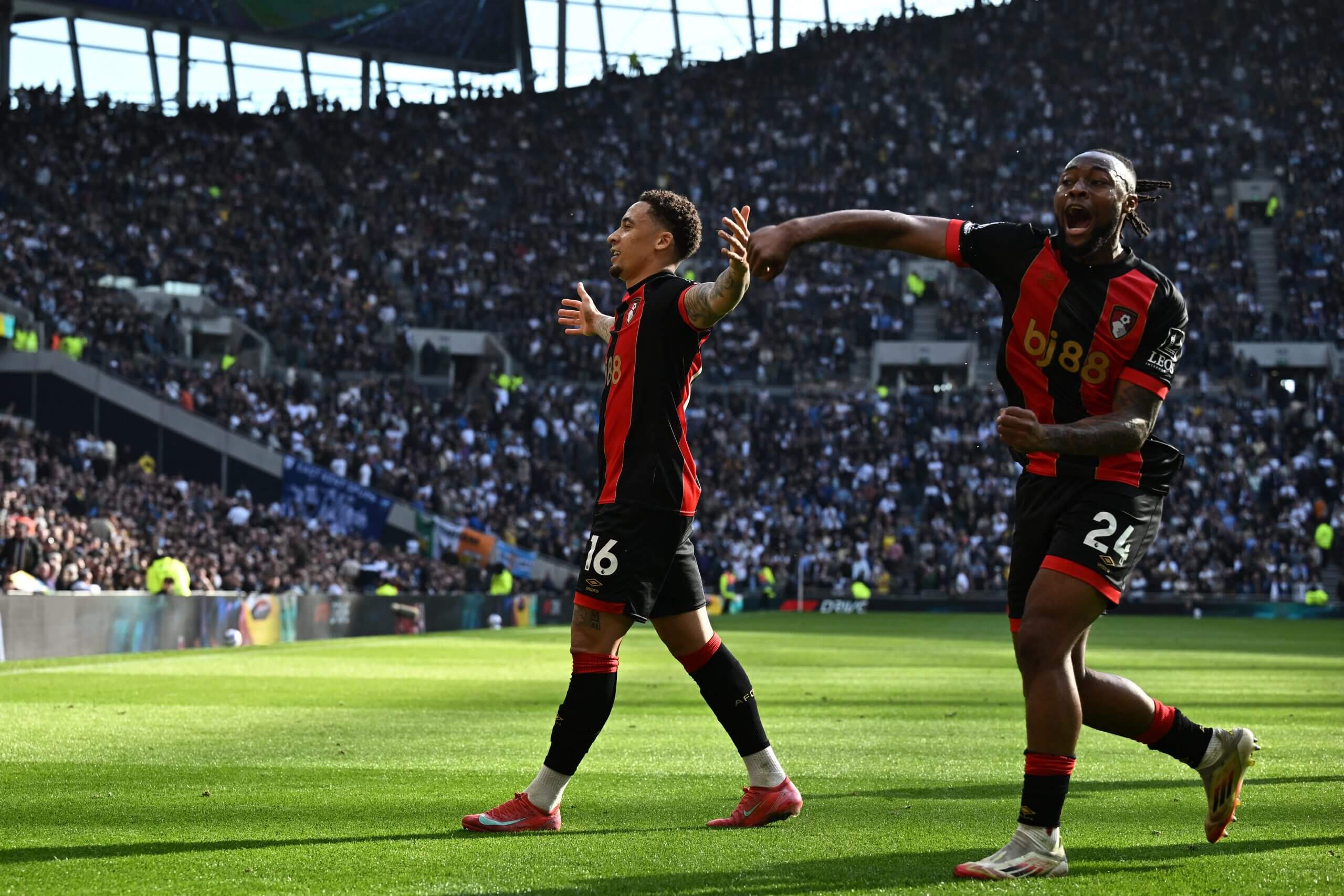
Bournemouth’s 56 points in the Premier League last season set a new club top-flight record (Ben Stansall/AFP via Getty Images)
He is learning to delegate.
“We have time to produce more small details. We have to get into depth, into the micro of everything. Analysts are very underrated in clubs because they are the ones preparing for the next game, giving us all the information — not only about the opposition, but also about our own team. I am going to be the one taking the decisions, but they give me the starting point. When you have analysts who know what you are going to demand in every phase of the game, they save you a lot of time.”
There is a good connection, too, with the club’s ownership under U.S. billionaire Bill Foley, who also owns the Las Vegas Golden Knights in the NHL, as well as having investments in Auckland FC, Lorient and Hibernian in soccer.
Towards the end of last season, Iraola was under consideration by Tottenham, who have since replaced Ange Postecoglou with Thomas Frank. “I was thinking since the beginning (to continue at Bournemouth),” he says. “I was very happy we had a very good season. I feel comfortable with with the players, the staff and the people in charge.”
His contract is up at the end of this season.
“I’m very happy here,” Iraola insists. “It is something we will discuss during the season. I’m very used to it being like this. The past season was the only one where I already had a contract in place for the next season. I’m very comfortable working this way.
“I like it when you get to the end of the season and have the meeting to say: ‘OK, you are happy with me?’. ‘Yes. I’m happy with you. Let’s keep going’. In the end, contracts, they look important, but especially for managers, we have to win. Otherwise, in two months, you can be out. For me, it (a contract) is not so important.”
For the coming season, Iraola is cautious in his expectations. His defence being plucked by Liverpool, Real Madrid and PSG is an affirmation of Bournemouth’s eye for recruitment and talent development, but he says replacements will need time to arrive at the level of those who have left the club. He has told his players he wants them to start games more effectively, as their numbers tend to be better in the second half of matches when the games “open up”.
Bournemouth in the PL last season
First
21
28.9
21
23.7
Second
37
36.1
25
25.6
“We have to be the best team we can be,” says Bournemouth’s head coach. “In the Premier League, there are eight or nine teams that everyone can say are above us and the rest of the teams. Among the others, we want to be as high as we can. If it can be as high last season, then amazing.
“When you start the new season, you don’t think you are going to get six points against Arsenal. We know that is going to be difficult. If we do not, we have to change those points for those we lost against weaker opposition.
“In the Premier League, we have to know that if we are not close to our 100 per cent level, then it is going to be very difficult for us to win any game. This is very clear because if we lose this humility, we are going to struggle for sure.”
(Top photo: Mike Hewitt/Getty Images)
